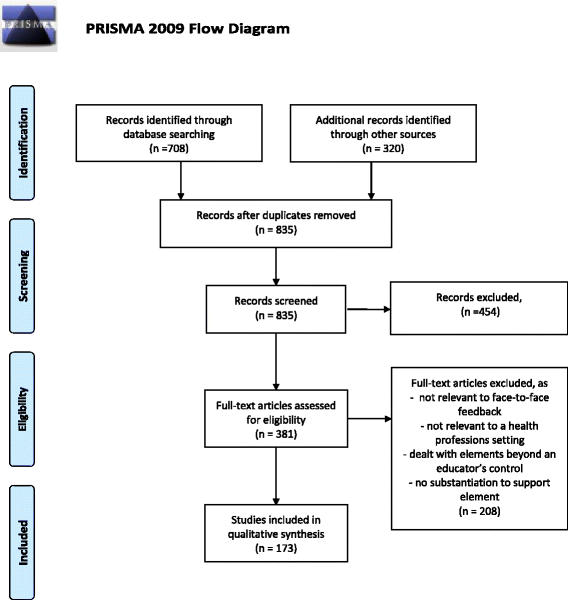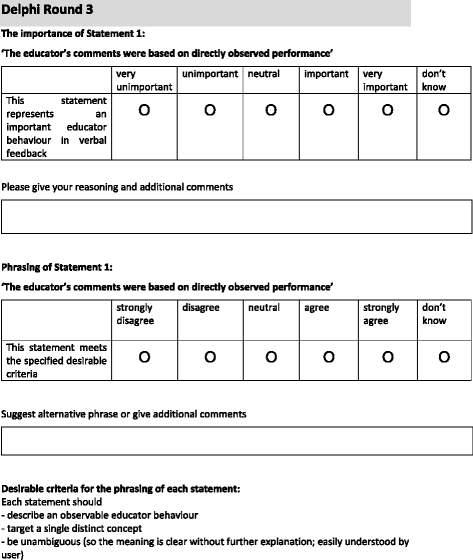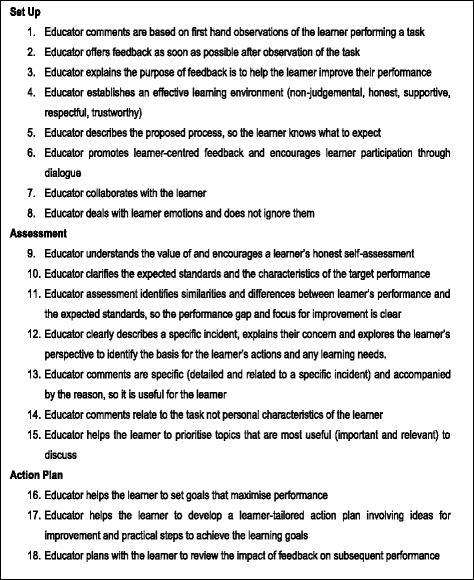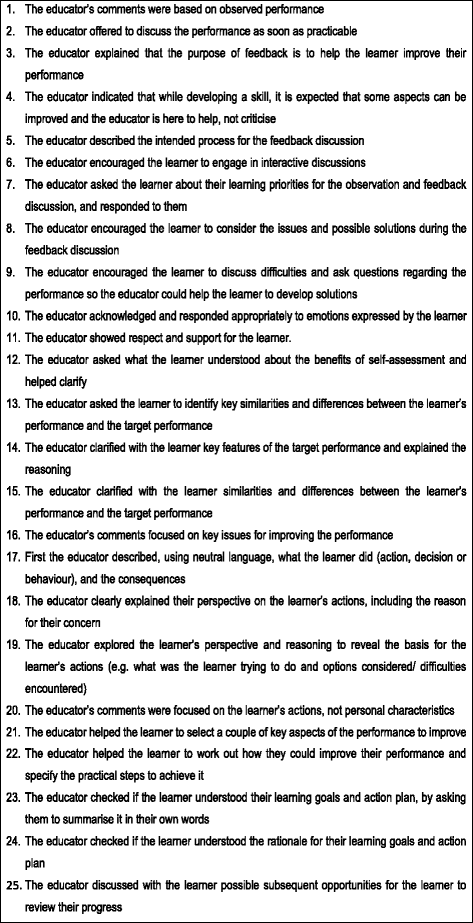Identifying educator behaviours for high quality verbal feedback in health professions education: literature review and expert refinement
- PMID: 27000623
- PMCID: PMC4802720
- DOI: 10.1186/s12909-016-0613-5
Identifying educator behaviours for high quality verbal feedback in health professions education: literature review and expert refinement
Abstract
Background: Health professions education is characterised by work-based learning and relies on effective verbal feedback. However the literature reports problems in feedback practice, including lack of both learner engagement and explicit strategies for improving performance. It is not clear what constitutes high quality, learner-centred feedback or how educators can promote it. We hoped to enhance feedback in clinical practice by distinguishing the elements of an educator's role in feedback considered to influence learner outcomes, then develop descriptions of observable educator behaviours that exemplify them.
Methods: An extensive literature review was conducted to identify i) information substantiating specific components of an educator's role in feedback asserted to have an important influence on learner outcomes and ii) verbal feedback instruments in health professions education, that may describe important educator activities in effective feedback. This information was used to construct a list of elements thought to be important in effective feedback. Based on these elements, descriptions of observable educator behaviours that represent effective feedback were developed and refined during three rounds of a Delphi process and a face-to-face meeting with experts across the health professions and education.
Results: The review identified more than 170 relevant articles (involving health professions, education, psychology and business literature) and ten verbal feedback instruments in health professions education (plus modified versions). Eighteen distinct elements of an educator's role in effective feedback were delineated. Twenty five descriptions of educator behaviours that align with the elements were ratified by the expert panel.
Conclusions: This research clarifies the distinct elements of an educator's role in feedback considered to enhance learner outcomes. The corresponding set of observable educator behaviours aim to describe how an educator could engage, motivate and enable a learner to improve. This creates the foundation for developing a method to systematically evaluate the impact of verbal feedback on learner performance.
Keywords: Clinical practice; Delphi process; Educator behaviour; Feedback; Health professions education.
Figures




Similar articles
-
Educators' behaviours during feedback in authentic clinical practice settings: an observational study and systematic analysis.BMC Med Educ. 2019 May 2;19(1):129. doi: 10.1186/s12909-019-1524-z. BMC Med Educ. 2019. PMID: 31046776 Free PMC article.
-
The nursing educator's role in e-learning: a literature review.Nurse Educ Today. 2014 Nov;34(11):1382-7. doi: 10.1016/j.nedt.2014.04.002. Epub 2014 Apr 24. Nurse Educ Today. 2014. PMID: 24797277 Review.
-
The Health Professions Education Pathway: Preparing Students, Residents, and Fellows to Become Future Educators.Teach Learn Med. 2017 Apr-Jun;29(2):216-227. doi: 10.1080/10401334.2016.1230500. Epub 2016 Nov 4. Teach Learn Med. 2017. PMID: 27813688 Free PMC article.
-
Development of the Feedback Quality Instrument: a guide for health professional educators in fostering learner-centred discussions.BMC Med Educ. 2021 Jul 12;21(1):382. doi: 10.1186/s12909-021-02722-8. BMC Med Educ. 2021. PMID: 34253221 Free PMC article.
-
Difficult debriefing situations: A toolbox for simulation educators.Med Teach. 2018 Jul;40(7):703-712. doi: 10.1080/0142159X.2018.1468558. Epub 2018 May 23. Med Teach. 2018. PMID: 29792100 Review.
Cited by
-
The integrative feedback tool: assessing a novel feedback tool among emergency medicine residents.Clin Exp Emerg Med. 2023 Sep;10(3):306-314. doi: 10.15441/ceem.22.395. Epub 2023 Feb 16. Clin Exp Emerg Med. 2023. PMID: 36796780 Free PMC article.
-
Finding common ground: meta-synthesis of communication frameworks found in patient communication, supervision and simulation literature.BMC Med Educ. 2020 Feb 11;20(1):45. doi: 10.1186/s12909-019-1922-2. BMC Med Educ. 2020. PMID: 32046704 Free PMC article.
-
GP trainees' perceptions on learning EBM using conversations in the workplace: a video-stimulated interview study.BMC Med Educ. 2020 May 6;20(1):139. doi: 10.1186/s12909-020-02051-2. BMC Med Educ. 2020. PMID: 32375745 Free PMC article.
-
Educators' behaviours during feedback in authentic clinical practice settings: an observational study and systematic analysis.BMC Med Educ. 2019 May 2;19(1):129. doi: 10.1186/s12909-019-1524-z. BMC Med Educ. 2019. PMID: 31046776 Free PMC article.
-
Effect of face-to-face verbal feedback compared with no or alternative feedback on the objective workplace task performance of health professionals: a systematic review and meta-analysis.BMJ Open. 2020 Mar 25;10(3):e030672. doi: 10.1136/bmjopen-2019-030672. BMJ Open. 2020. PMID: 32213515 Free PMC article.
References
-
- Morris C, Blaney D. Work-based learning. In: Swanwick T, editor. Understanding medical education: evidence, theory and practice. Oxford: Assocation for the Study of Medical Education; 2010. pp. 69–82.
-
- Higgs J. Ways of knowing for clinical practice. In: Delany C, Molloy E, editors. Clinical education in the health professions. Sydney: Elsevier; 2009. p. 26.
-
- Boud D, Molloy E, Boud D, Molloy E. Feedback in higher and professional education. London: Routledge; 2013. What is the problem with feedback? p. 6.
-
- Hattie J, Timperley H. The power of feedback. Rev Educ Res. 2007;77(1):81–112. doi: 10.3102/003465430298487. - DOI
-
- Sadler DR. Formative assessment and the design of instructional systems. Instr Sci. 1989;18(2):119–144. doi: 10.1007/BF00117714. - DOI
Publication types
MeSH terms
LinkOut - more resources
Full Text Sources
Other Literature Sources

